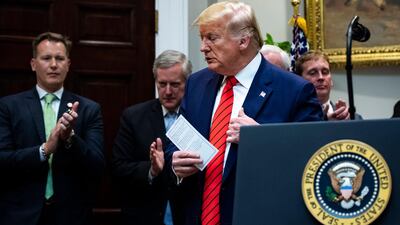Only forty-five minutes after Turkey announced its incursion into north-east Syria, US senators introduced a harsh sanctions bill against Ankara that will be put to a vote next week.
The move was yet another reflection of rising anger in Washington at Turkey's action and a rebuke of US President Donald Trump, who has emerged as a lone voice in offering support for the Turkish operation.
On Wednesday afternoon, Republican senator Lindsey Graham and Democrat Chris Van Hollen introduced a forceful sanctions bill targeting the assets of Turkish President Recep Tayyip Erdogan and his top officials, and banning transactions with the Turkish military.
The bill goes even further in including anyone who supports sectors of Turkey’s oil and energy industry that back its military.
It's language is reserved for countries that have severe diplomatic problems with Washington, such as Iran, Russia and Venezuela.
Mr Graham and Mr Van Hollen are expecting an initial vote on their bill next week when Congress returns from recess.
While Mr Trump would probably veto such a bill, that could be overriden with support from two thirds of the Senate, or 66 votes.
Speaking to Axios after proposing the bill, Mr Graham said he believed he wouldl have enough votes to defeat a veto.
"Who the hell supports Erdogan over the Kurds?” he said.
Republican and Democratic legislators were united in condemning Turkey’s incursion into Syria.
Democratic candidates seeking the nomination to run for the presidency, including Bernie Sanders and Elizabeth Warren, have opposed the operation and Mr Trump’s approach.
Libertarian Rand Paul was the only senator to come out publicly in support of Mr Trump’s withdrawal intentions from Syria, but not of the Turkish operation.
A senior administration official has contradicted Mr Trump about the withdrawal, saying this week that “this is not the beginning of a pullout” of an estimated 2,000 US troops from Syria.
Fox News reported on Wednesday that US commanders in Syria were surprised by Mr Trump’s decision.
Aaron Stein, director at the Foreign Policy Research Institute, told The National: "We have a dual Turkey policy problem.
"We have Donald Trump, who is close to Mr Erdogan, and a US bureaucracy that is not. It creates a sense of incoherence."
Mr Stein expected the sanctions bill to receive majority and bipartisan support, but he said Mr Graham “has a Trump problem”.
The Senator, who has been regarded as Mr Trump’s "whisperer" in the past two years, is parting ways with the president over the issue.
“He [Graham] will need a partner to implement in the executive,” Mr Stein said.
So far, Mr Trump has delayed sanctions on Turkey for buying the S-400 Russian missile defence system under an act passed in 2017, with overwhelming bipartisan majority, to try to stop significant transactions with Russia.
The Pentagon punished Ankara last July for the purchase by expelling it from the F-35 jets consortium and halting its sales.
Nicholas Danforth, a senior visiting fellow at the German Marshall Fund, saw a larger problem for US-Turkey relations that could be further fuelled by the close association with Mr Trump.
"Turkey may end up bearing the brunt of Washington's outrage over Mr Trump's withdrawal decision," Mr Danforth told The National.
“The coming weeks will test Turkey’s strategy of putting its faith in Trump and ignoring rising anger in the US Congress.”
Mr Erdogan is due to visit Mr Trump on November 13, amid the US president's impeachment inquiry and the Syria operation.
“The intense anger on both sides could create a vicious cycle that does more damage to the relationship than either side intends," Mr Danforth said.
“It could leave Turkey more isolated."

